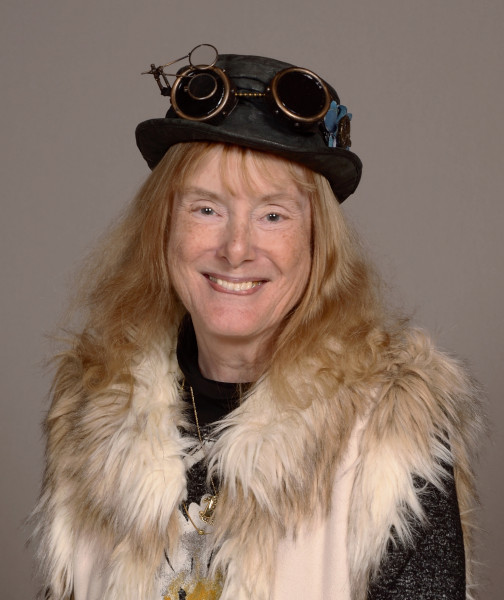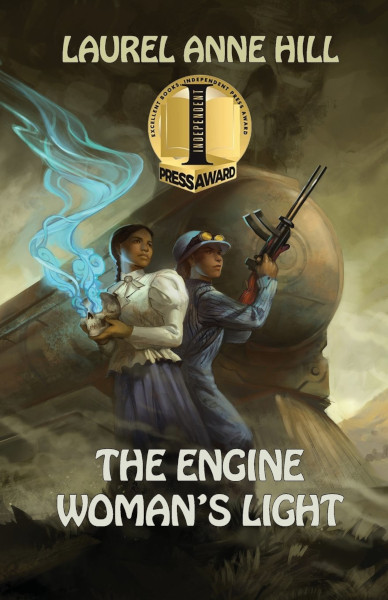
# Please introduce yourself and your book(s)!
I’m Laurel Anne Hill, author and former underground storage tank operator. Really! I write speculative fiction (science fiction, fantasy, steampunk and horror). My three novels have been published by small publishing houses. Other publishing credits include over thirty short stories, a bunch of short nonfiction pieces and one scientific paper.
# What is/are the real-life story(ies) behind your book(s)?
My father and my first husband were both half-Mexican, so I could identify with the Mexican characters I was creating. My father was an alcoholic and physically abusive toward my mom. I received psychological abuse from my first husband. And my near-death experiences with water and heights also contributed to the realism in my protagonists’ adventures. Website: laurelannehill.com.


# What inspires/inspired your creativity?
The characters inside of my head told me to write their stories. Unfortunately, they provided few up-front clues as to what this would involve.
# How do you deal with creative block?
For many years, I didn’t realize I had this problem. I would keep thinking of ideas and/or writing them down until I found something that worked. In recent years, I might need to stare at a blank computer screen for 30 minutes before the ideas start flowing, but they usually do. When they don’t flow, I go pour another cup of decaf (morning) or one glass of wine (night). That has worked pretty well.
# What are the biggest mistakes you can make in a book?
In a novel, not having a story arc. Or not having the right mix of character, plot and tension for the type of story (literary vs genre). Or creating a character without flaws or one with nothing but flaws.
# Do you have tips on choosing titles and covers?
I work with small publishers so I usually get a say in the selection of titles and covers. If my publisher doesn’t like my working title or proposed cover, I work with them to make changes. My advice? Don’t choose a title that’s too long, or that suggests a different genre than you are actually writing. If the title must exceed several words, break it into a title and subtitle. The cover will depend upon the type of book. Fiction versus nonfiction. Cookbook versus autobiography. Literary versus romance versus science fiction /fantasy/ horror/mystery.
# How do bad reviews and negative feedback affect you and how do you deal with them?
Bad reviews bother me, but less so than they once did. These days I generally just groan, then laugh or shrug. What bothers me most is the person who gives a “one” out of “five” rating without a meaningful explanation. The reader decides in the first paragraph that this is not their type of book, stops reading and gives a rating of “one.” They didn’t even read the book! How I handle negative feedback depends on what it is and where it came from. I know I write well, but speculative fiction is not for everyone.
# How has your creation process improved over time?
My first short story to be published appeared in the children’s section of a major San Francisco newspaper when I was eleven years old. The piece (for which they paid me two dollars) was horrible—but I loved it at the time. The next short story I recall was several years later and far more believable. I entered it in a Macy’s contest for teens and won first prize: I got to go to Macy’s in downtown San Francisco and pick out any outfit in the teen department that I wanted. I entered and won enough student essay contests in high school to pay for four years of college tuition and books. And I improved when I entered a contest two years in a row—winning a Bulova watch (fifth proze) as a junior and a Magnavox stereo system in a cabinet (first prize) in my senior year. My creative writing improved in college. My career choices forced me to do technical writing. My hallucination of the grim reaper in the early 1990s jump started my career writing speculative fiction.
# What were the best, worst and most surprising things you encountered during the entire process of completing your book(s)?
The best thing? I got my three novels finished, published, and they won a total of thirty-three honors and awards. The worst thing? One book took 15 years to complete and the other took 20 years. The most surprising? I actually learned how to run a steam locomotive in order to complete “The Engine Woman’s Light.”
# What role do emotions play in creativity?
Love, hate, fear, anger, grief, disappointment, joy: all of these live somewhere inside of me. When I develop a character’s emotional reactions, I go to my memory collection for help.
# Do you have any creativity tricks?
Listening to music with which my protagonist can identify. Such music often falls into the category of “world music.” Sometimes, however, I go classical.
# What are your plans for future books?
I’m working on a spirits-meet-steampunk novel where an unknown adversary tries to eliminate my teen-age Mexican protagonist’s entire family. Working title: When Fire Ruled the Wind.
# Tell us some quirky facts about yourself
1. During the last five to six years of my multifaceted career based in the scientific field, my boss gave me an additional duty: To become the licensed underground storage tank operator for our 53-acre pharmaceutical research and development site. 2. To write my second novel, The Engine Woman’s Light, I had to learn to run a steam locomotive. 3. Between ages 15 and 30, I had eight to ten very close brushes with death, all involving heights or water. 4. I belonged to a poor family, with three generations living in a two-bedroom flat in San Francisco. I wanted to go to college and become a medical technologist. As a high school student in San Francisco, I entered many essay contests and won enough money to pay for four years of tuition and books at San Francisco State College.